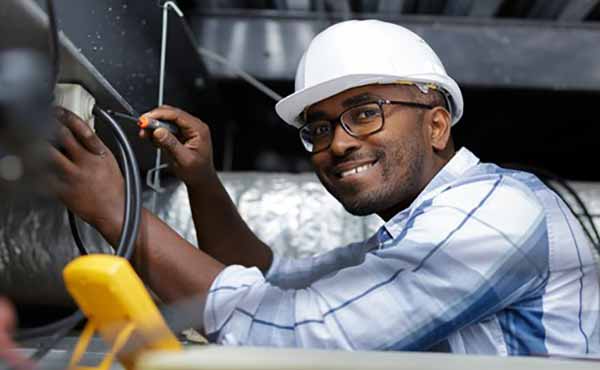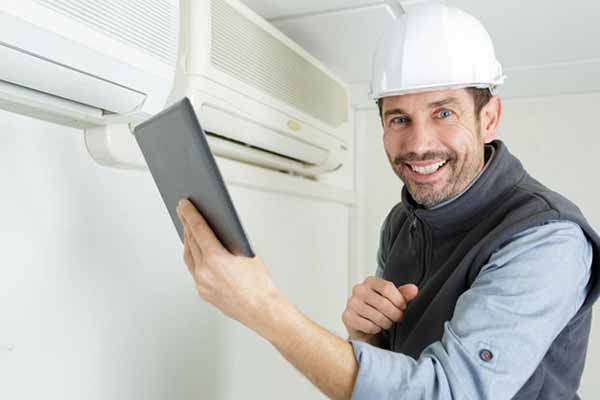If you’re interested in saving energy and lowering your utility bills, your HVAC system may be a good place to start. The ways the right HVAC contractor can lower energy costs are numerous and can go a long way toward helping you do your part to reduce your carbon footprint.
There are several reasons why saving energy should be a fundamental goal for everyone. First, by reducing our energy use, we increase our energy security and lower our contribution to global warming and pollution. But our energy consumption also has cost implications at every turn. When considering our energy consumption, we need to investigate our behaviors and the systems we use in our homes and places of business.
Since heating, ventilation, and air conditioning (HVAC) systems account for about 50% of our energy consumption in residential use, it’s one of the first aspects to consider in reducing our energy costs.
While using our heating and cooling systems more cautiously plays a significant role in energy efficiency, it begins with choosing the right HVAC contractor.
What Does an HVAC Contractor Do?
An HVAC contractor is responsible for installing, regulating, and maintaining climate control systems in homes and commercial properties. Regardless of whether you’re in need of a new air conditioning unit, heat pump, furnace, or require repairs on an existing appliance, an HVAC contractor is critical in determining your energy efficiency.
Why Should I Research an HVAC Contractor Before Hiring Them?
Not all HVAC contractors have the same skill set and experience or offer the same services. For example, although all HVAC contractors are trained in basic heating, ventilation, and air conditioning, some focus on one or two areas or work only in residential or commercial properties.
Generally, new HVAC technicians start with and focus on routine maintenance, whereas diagnosing air conditioning issues requires more expertise. As a result, installing air conditioners and furnaces calls for the highest level of training and the widest variety of skills.
HVAC contractors also differ in the equipment and systems they use. While some focus on water-based heating systems, others specialize in forced-air systems and others on solar-based systems.
How Can an HVAC Contractor Help Me Reduce Energy Costs?
The right HVAC contractor will be a practical cost-saving resource. Here are some things that competent contractors and their technicians will do to help you become more energy-efficient.
Offer HVAC Energy Audits
An HVAC energy audit involves measuring the energy efficiency of an existing system.
There are three levels of HVAC audits:
Level 1: A level 1 audit is a general examination of a building’s overall energy output and associated utility bills. Only major HVAC problems are identified.
Level 2: Level 2 audits are an in-depth analysis of energy consumption involving complex calculations and a thorough examination of a building’s systems operations. These audits will also include recommendations for improved HVAC energy efficiency.
Level 3: The most complex of the three processes, a level 3 audit expands on levels 1 and 2. Again, more data is collected, and the energy auditor conducts thorough engineering analyses of the benefits of improving your HVAC system. Finally, projections are made for your future energy efficiency.
Do Preventative Maintenance on Your HVAC System
A good HVAC contractor takes responsibility for regular maintenance to prevent breakdowns. Preventative maintenance ensures that your appliances function optimally and also increases their longevity. In addition, when your equipment is energy-efficient, you save on monthly utility bills, and maximizing its life span means you don’t have to purchase new equipment every other year.
Here are a few preventative maintenance duties you can expect from your HVAC contractor:
- Check AC refrigerant levels and air filters
- Inspect for AC and gas leaks
- Ensure proper airflow by cleaning and straightening condenser coils
- Check electrical connections
- Ensure that moving parts are properly lubricated
- Test thermostats
Suggest Alternative Heating and Cooling Sources
Your existing heating and cooling system might not be the most energy-efficient. An HVAC contractor worth their salt will suggest energy and cost-saving alternatives, and find strategic ways you can reduce your energy consumption.
Aside from energy-efficient HVAC systems, several other methods for naturally warming or cooling spaces exist. Again, your contractor should be a good resource in this regard.
Suggestions they might give for keeping your house cool in the summer may include:
- Use insulation
- Optimize the shade you have
- Plant more trees, shrubs, and vines near the building
- Block out the sun by using blackout curtains and blinds
- Install exterior shade screens
- Install roof vents
They may recommend ways to keep your house warm in the winter:
- Move furniture that blocks radiators
- Use rugs or install carpeting
- Close the dampers on your ductwork
- Use hot water bottles
- Let sunlight in
- Reverse the motion of your ceiling fan
- Cover the openings where draughts enter
Promote Energy-Efficient Appliances
Not all HVAC systems are created equal. Some HVAC systems use far more energy than others. Your HVAC contractor should promote the most energy-efficient units on the market, and while these might be expensive to install, they’ll save you a great deal in the long run.
Below is a breakdown of the two best options.
Open Loop Geothermal HVAC System
By leveraging the earth’s surface temperature, these systems use groundwater to transfer thermal energy into a building. As a result, they don’t require gas or oil to function, which radically lowers your utility costs.
Ductless Mini Split HVAC System
These systems provide buildings with zoned cooling and heating, implying that areas are controlled with separate thermostats. As a result, buildings naturally have warmer and cooler areas and therefore don’t require the same amount of energy to maintain the desired temperature. These systems involve one or more indoor units and an outdoor compressor that, together with copper tubing, direct air straight into the various rooms.
Give Energy Saving Advice
Your HVAC contractor might also advise you about, and help you implement, the following energy-saving HVAC practices:
- Temporary fixes for old systems; you might still get good use of your old system by improving its energy efficiency
- Installing programmable thermostats means you can change the temperature and turn it up or down when you are away
- Ensuring your ducting is properly sealed prevents leaks, thereby increasing energy savings
- Installing fans; ceiling and floor fans can improve HVAC efficiency by helping with air circulation
Enter your ZIP Code and compare electricity rates
How Can I Hire the Right HVAC Contractor?
Hiring the right HVAC contractor can feel a bit overwhelming for the uninitiated. Below are a few essential questions to ask before hiring an HVAC contractor.
Are They Licensed to Be an HVAC Contractor?
Your HVAC contractor should be licensed in their state. They should indicate their license number on their website or the listing where you found them. While you might be tempted to hire an unlicensed person because their rates are lower, it could cost you more (and introduce safety risks) if they lack the necessary skills. Because it’s not easy to obtain this license, you can ensure that a licensed contractor has had extensive training and experience. They’re also familiar with the industry rules and regulations, which minimizes your risk of problems later on down the road.
Do They Have Insurance?
Your HVAC contractor needs to have sufficient insurance coverage to protect their business and you from liability should an accident happen. If you decide to hire an uninsured contractor, you’ll risk being on the hook for the cost should your property be damaged or they’re injured while on duty in your home or place of business.
Do They Have the Relevant HVAC Certifications for My Needs?
Find out whether your contractor is part of a relevant association to keep them up-to-date with the latest developments in the field. If the HVAC work you require is specialized, ensure they have the necessary certifications.
The following are a few examples of specific certifications:
- Technicians who work with refrigerants require an Environmental Protection Agency (EPA) Section 608, R-410A certificate, or both
- An indoor air quality certificate is recommended for all HVAC technicians
- Although a North American Technician Excellence (NATE) certification is voluntary, it speaks to competence in specialized areas
- A preventative maintenance certificate indicates that a contractor is aware of the need for regular check-ups
- HVAC Excellence certifications prove that technicians are at a professional or master specialist level
- Administered by the Air Conditioning Contractors of America (ACCA) group, a contractor can obtain the HVAC Quality Installation Standard in residential or light commercial HVAC designs
Are There Good Reviews About Their HVAC Work Online?
Be sure to read reviews about the contractor you have in mind. These reviews should be recent and posted by reputable sources. Genuine reviews will provide specific details, including technician names and the customer’s experience of their behavior and work. However, it’s also wise to be wary of reviews that sound too good to be true.
Does the HVAC Contractor Have References?
Getting referrals from others who have previously solicited the contractor’s services is a sure way to discover if they’ll deliver on their promises and meet your particular needs. Contact at least three people before deciding on the right contractor.
How Does Their Quote Compare to Other HVAC Contractors on the Market?
When comparing quotes, pay attention to details such as brand names, model numbers, and SEER ratings. Then, you’ll be able to quickly evaluate the quality of their offer. Moreover, consider value-added services that you might otherwise have to pay extra for.
Do They Offer a Written Contract for the HVAC Work They’ll Do?
Before hiring an HVAC contractor, sign a contract with stipulations you have read and agree to.
The contract should clearly outline the following:
- HVAC components that will be covered
- Number of maintenance visits
- Specific maintenance tasks that the contractor will fulfill
- How you will save costs
- Exclusions (if there are any)
- Explanation of labor costs
- Who will incur the charges of minor repairs
- The party responsible for scheduling appointments
- How frequently a new or updated contract is required
- Terms of payment
An HVAC Contractor Can Mean Big Energy Cost Savings if You Hire With Care
It’s helpful to know the ways the right HVAC contractor can lower energy costs. It all starts with selecting your contractor wisely. Choosing the right HVAC contractor is a crucial part of energy and cost-saving.
Qualified, competent HVAC contractors will guide you on the best equipment and appliances to use and ensure that your systems perform optimally year-round.
Brought to you by energysavings.com
All images licensed from Adobe Stock.
Featured image:



